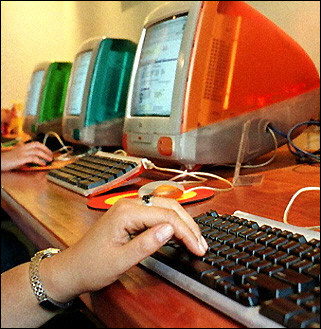The Epoch Times
Feb 03, 2004
|
|
| Row of computers in a cybercafe.(AFP/File/Marie Hippenmeyer) |
For many of us logging on to the Internet has become part of our daily routine. Just as we might flick through our local newspaper, catch the latest news on the telly or tune into our favourite radio station, the Internet is fast becoming part of every day life.
As you turn your computer on and prepare to lose yourself in cyberspace, spare a thought for Internet users in China. China has the second largest pool of users after the U.S. with potentially 70 million users now logging on. This has created problems for a state that tightly controls traditional media outlets like newspaper and television.
Though the Chinese Government wants to move with the times, it also wants to restrict what the population reads and writes. Sensitive issues, including high-level corruption, Taiwan's independence, criticism of the Communist Party and support for the Falun Gong spiritual movement are areas it considers off limit.
Xiao Qiang, director of the Chinese Internet project at the journalism school at the University of California in Berkeley, identifies three broad tools China employs to maintain control: the law, technology, and self-control.
The authorities have recently started arresting people for posting what it deems negative articles on overseas websites. Frank Lu of the Hong Kong-based Information Centre for Human Rights and Democracy said that "You no longer even need to be an activist; just posting your own article is enough. Fourteen Internet essay writers have been arrested, sentenced or denied appeal since mid-October 2003.
Add to this, the Government's increasing use of technology to block and divert users away from areas it considers sensitive. Bill Xia, President of U.S. company Dynamic Internet Technology said, "With new technology, they are upgrading their system within a couple of months, though they probably have to go through approvals, I'm rather impressed by their speed."
Recently new measures to monitor users at Internet cafes were introduced. All the Internet users now have to show their personal ID card, driver's license or other valid identification in order to buy an "Internet Shield Internet Access Identity Card." They then slide the card through the scanning device installed in the cafés by the police to validate their identity in order to access the Internet each time. This means that all the users' activities while accessing the Internet in the cafés have now been brought under tight control and are being closely monitored. What technology fails to block is monitored by an ever-increasing cyber police force. Despite all these efforts most experts say the state is slowly losing the struggle.
The self-control that individuals maintain is possibly the most effective method the government has of preventing Chinese from crossing the line and signing onto sites with politically sensitive issues. However, ever since the scandal of the Chinese government covering up the SARS outbreak and hiding it from its citizens and the rest of the world, Chinese people have realized the importance of having the right to know the truth. Thus, accessing the Internet has become a very important and possibly the only channel to get true information.
The expanding Internet medium offers Chinese people their best chance of circumventing the control and censorship the state wields with the more traditional media. This can only be viewed as positive for both China and the rest of us.
http://english.epochtimes.com/news/4-2-3/19358.html
All articles, graphics, and content published on Minghui.org are copyrighted. Non-commercial reproduction is allowed but requires attribution with the article title and a link to the original article.
Category: Falun Dafa in the Media




